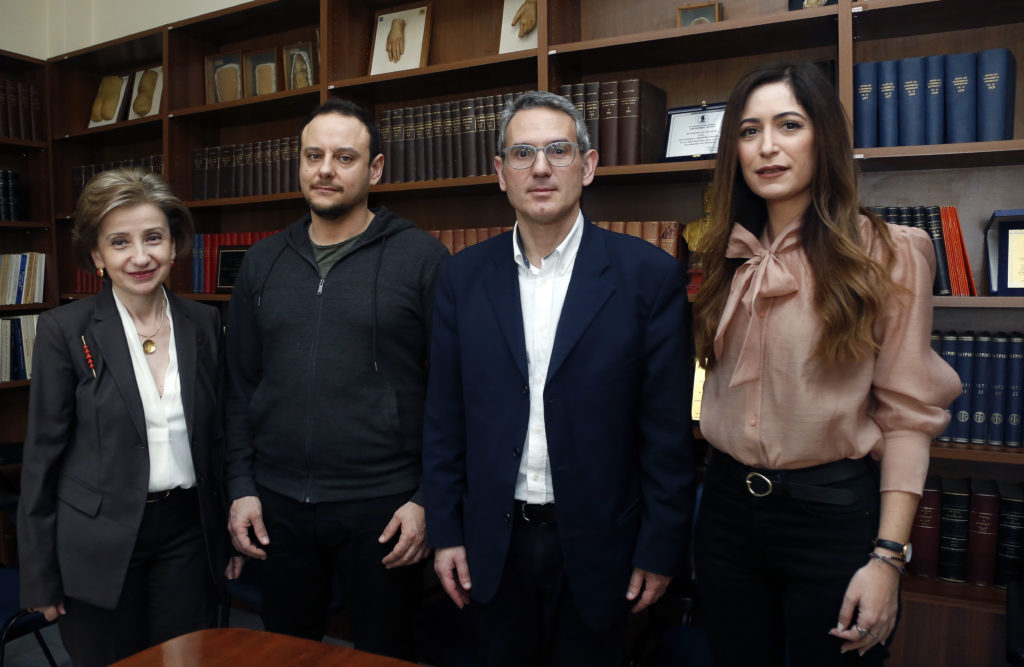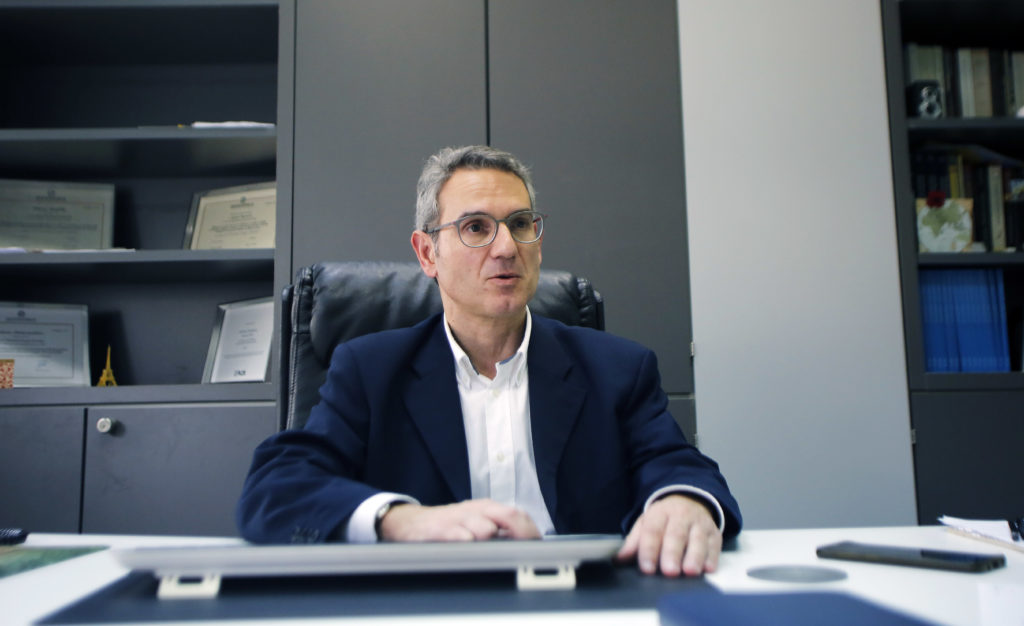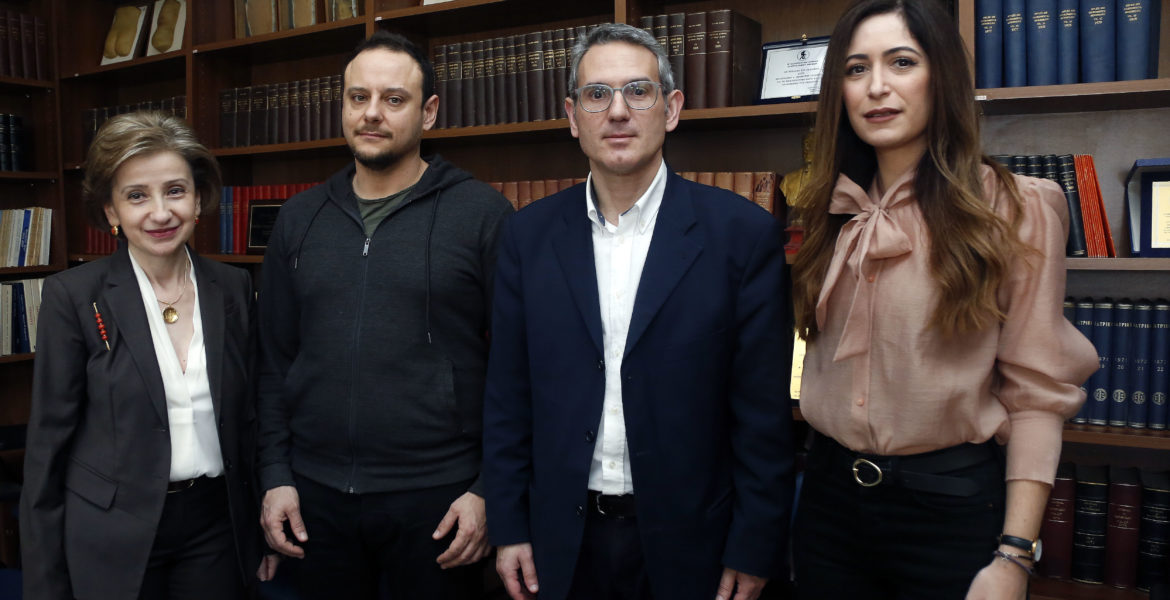
Greek Epidemiology Professor Dr. Dimitrios Paraskevis, the scientist who “broke” the coronavirus DNA, speaks exclusively to Greek City Times and provides answers on the potential availability of a vaccine against the virus, what we should be mindful of and how the lethal coronavirus started spreading.
By Konstantinos Sarrikostas
What is it actually like “running after” lethal viruses on a daily basis, 24 hours per day; locating, analyzing and decoding genetic material which leaves a hecatomb of dead people in its wake?
The “Father of Medicine” Hippocrates became the founder of Orthologic Medicine discouraging his fellow citizens from metaphysical elements, superstitions and even prejudices. Actually, he said that “in serious diseases, the most effective method in treatment is absolute accuracy and fastidiousness”, which modern doctors, who follow his oath, literally strive for in the healing of their fellow human beings.
Dr. Dimitrios Paraskevis, a modern Hippocrates, is Deputy Professor of Preventive Medicine and Hygienic Epidemiology at the Medical School of the National and Kapodistrian University of Athens. Along with two fellow colleagues, he has managed -in time- to analyse and decode the DNA of the lethal coronavirus which recently broke out in China and has alarmed the international community.
According to Dr. Dimitrios Paraskevis we are in the final stages of discovering a vaccine against the virus, its cause and origin and vital information on how to protect ourselves from it.
As he points out, in a few months’ time we will have the vaccine against the coronavirus; but what is absolutely essential is the total implementation of hygiene rules and most importantly behave with great composure.
THE INTERVIEW
Professor, the entire planet is discussing the coronavirus and people's concern is really great. Could you please tell us in simple terms what the coronavirus is and why it has spread so rapidly?
The coronavirus spreads relatively easy for several reasons, the most significant one being that it can be spread by droplets if someone is exposed to them, for instance through sneezing or coughing. Other reasons include the fact that no preventative measures were taken to contain the virus or at the very least limit its spread, especially when it first infected people at the end of November and the beginning of December 2019 – a period of prime importance.
This happened because it is an unknown virus and as such there was no awareness amongst the people in China in order that they initiate the necessary control measures. Therefore, when a great number of people have already been infected, you realise that from that point on, it is more difficult to control the infection. Moreover, owing to the fact that universal transfers are really easy nowadays, a disease can easily be spread globally”.
From your studies and genetic analysis as the lead scientist of your research team , have you reached a conclusion about how it started? Was it, after all, spread by bats or could it be a lab product: a discussion which exists globally?
The coronavirus belongs to a team which is characterized as “B team” and it's the same team to which the virus which caused the epidemic SARS in 2003 belongs. The genetic material of the virus which has caused this present epidemic, presents a great proportion with the genetic material of the relevant virus infecting bats.
Talking about proportion we mean that it reaches the level of 96%; that is, the possible source of infection is this particular animal, i.e. bats. Of course, we cannot rule out the fact that the infection can be made by another animal, another carrier, another mammal which has been infected by bats and this, in turn, transferred it to humans. This will be hard to find because we have to find the particular animal and locate the truth, the part of the virus which caused the infection. But, on the other hand, it is not of a particular importance either for epidemiology or for research in the creation of vaccines or antivirus drugs.
As to whether the virus has been created in a lab, that is, if it is a product of human intervention, I would like to assure you that such theories exist almost always in every epidemic with every new virus.
There is no possibility –scientifically- that something like this has happened. There is no possibility because it was confirmed that this virus exists in animals, the infections from animals to people are very frequent and also all the people from whom it was isolated and characteristically the virus in China during the period of December, had an identical virus, which means that this was the result of infections among diverse people. Therefore, allow me to repeat that human intervention or the possible origin from a lab, should be indisputably ruled out.
The World Health Organization (WHO) has not used the term pandemic yet. Is it, Professor, a pandemic and when does a pandemic exist?
A pandemic, according to WHO, is defined as such when the epidemic has a great spread in, at least, two areas, in two continents. The areas as they are defined by WHO, are not exactly the geographic continents, but they are slightly different. Not to get into many details, the definition of pandemic refers to the geographic spread and not as much to the number of cases.
In Greece, for the time being, there are no certified cases. Do you believe, too, that it is a matter of time before we will be seeing our first case? How well-prepared is our country with the measures that are increasingly updated.
In Greece, there is no certified case. There may be but it is unlikely that there are any. The authorities have taken the appropriate measures, have announced the protection measures to be undertaken by health professionals, by the population and what people who travel should be mindful of.
We are informed about measures in airports and there has been an attempt for a prompt diagnosis of a possible case which is absolutely important to limit further infections.
Is the diagnosis of the specific virus easy and what are the symptoms?
The symptoms are identical to the ones of the flu and the definition of a potential case is related to whether someone has been exposed to other people from areas in which there are cases. That is, a fellow citizen who has not travelled and has flu symptoms, as you realise, does not have this virus.
So, in the first stages and absence of a case in Greece, if someone has symptoms, these symptoms should be accompanied with an exposure to another possible case, obviously and possibly outside Greece so that there may be a realistic possibility that they have been infected. Therefore, our fellow-citizens are more likely to suffer from the flu or another virus rather than the coronavirus.
The documentation of the infection, is feasible at the Paster Institute as well as in other laboratories which can diagnose if an infection is caused by this specific virus.

As far as travelling is concerned and according to WHO, people should not restrict their travels unless they are in areas in which there is a great number of cases. However, they should follow all the instructions which are recommended in reference to the prevention of infection from these viruses. What are some preventative measures?
People should wash their hands with soap for about 20 seconds and especially when they are in congested places such as airports; they should avoid touching their eyes, nose or mouth with their hands. So, when we find ourselves in public places where there are several fellow- citizens, we should bear in mind that we must take great care of our hands’ hygiene and that they must not touch our face. Also, if we feel symptoms identical to the ones of the flu, we should stay home, so that we don’t expose other people to danger; and if symptoms persist, we should ask for medical advice.
Is the mask just some fashion accessory or does it actually contribute to the restriction of the virus spread?
The mask does not constitute the absolute means of protection and it doesn’t mean that anyone who wears it is either totally or to a great extent protected from a possible flu infection or coronavirus. The role of the mask is to protect other people from the sufferer who must wear it. If they sneeze while talking, much fewer droplets are exposed, therefore the mask is a way of protection, especially for the protection of others. So, someone wearing a mask should be aware of the fact that they are not totally protected from these viruses.
Professor, why is this virus so lethal? There have have already been 630 deaths and more than 31.400 cases*?
We should clarify the following: The coronavirus is not so lethal in relation to other viruses. The number of deaths concerns a relatively great number of people about whom the coronavirus infection has been documented. Coronavirus as well as flu virus causes, to a great extent, very mild symptoms.
As a result, the number of people who have been infected is much bigger than the number of people whose infection has been documented. So, the denominator, when we estimate death-rate, is much bigger because the real number of the cases is unknown and a lot bigger related to those who have the infection documented.
Until now, the death-rate was considered to be approximately 3% to 4% but it is possibly much less because as I already earlier the real number of the cases is unknown.
Those who are more susceptible to this infection are older people, vulnerable groups and people who suffer from chronic heart diseases, chronic breathing diseases and immunodeficiency. The above categories constitute the percentage of serious symptoms or death.
How far or how close are we for the coronavirus vaccine creation? Can we be optimistic since a relative treatment for very old viruses and lethal diseases has not been found yet?
There are viruses, as you have correctly mentioned, for which it is not easy to develop vaccines. Hopefully, the coronavirus does not have these characteristics.
We consider that the coronavirus vaccine will be available relatively quickly, possibly even in a few months if we also estimate the time required for clinical tests.
Several Institutes and Centres have actively engaged in the creation of the vaccine. It is believed that in some weeks vaccines will be available for clinical tests. In the meantime, protection measures are vital for the restriction of the virus and for our protection.
I would like to point out once more: there are other viruses and diseases that are really dangerous. I realise how worried people are; the coronavirus is something new. However, Greece and the international community have been confronted with similar threats before, over the last 10 years, a fact that fills us with optimism.
We have the experience and the know-how so that we can face this menace effectively. What is really necessary is composure and optimism about the fact that even this disease will be challenged effectively with minimum human cost.
* Data as of the time of interview


